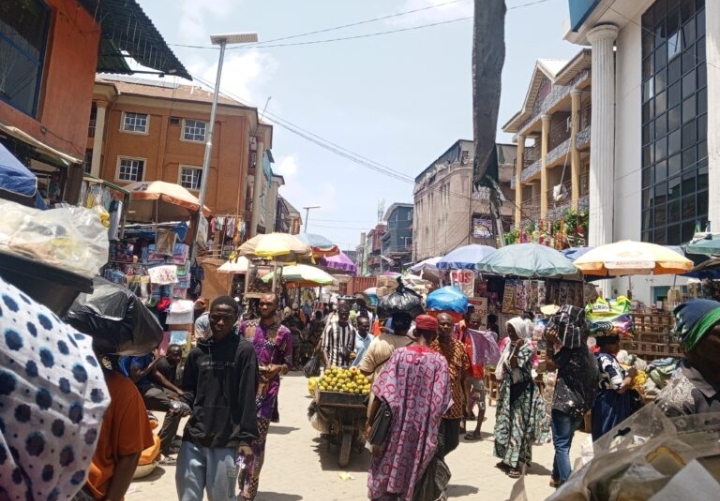One Year After the Flames: Traders at Lagos Island’s Dosunmu Market Rebuild Lives and Businesses Through Resilience and Support
One year after a devastating fire swept through the bustling Dosunmu Market in Lagos Island, some traders are gradually rising from the ashes—one bank loan, one rebuilt shop, one act of resilience at a time.
The inferno, which tore through 14 buildings on April 9, 2024, reduced thriving businesses and decades of effort to smouldering ruins. What was once a hub of commerce turned into a scene of heartbreak and uncertainty.
Yet, amid the rubble, stories of survival, perseverance, and new beginnings are emerging.
A Lifetime’s Work Lost—But Not in Vain
Alhaja Modinat Bakare, a seasoned importer of tailoring accessories, had just restocked her warehouses when the disaster struck.
“Everything I worked for over 40 years was gone in a day,” she recounted, her voice heavy with emotion in an interview with the News Agency of Nigeria (NAN).
It wasn’t her first loss. Just months earlier, Bakare had lost another shipment stored at a friend’s warehouse. But the April fire was the final blow.
“I watched my two warehouses burn down, powerless. I had loans to repay and no business left.”
Her turning point came through the intervention of IBILE Microfinance Bank Ltd. The bank helped restructure her existing loans and granted her fresh credit at a lower interest rate.
Today, Bakare is back in business—cautious but determined.
“I’m not fully recovered, but IBILE saved me. Without their help, I don’t know where I’d be.”
From Ruin to Advocacy
For Mr. Olabanji Raheem, a trader in baby care products, the fire didn’t just destroy goods—it erased a legacy.
“I lost 24 shops, a building, everything. It was a dark moment,” he said.
Now serving as the Chairman of the Moshalashi Traders Association, Raheem has become an advocate for insurance awareness among market traders.
“We don’t think about insurance until tragedy hits,” he admitted. “This experience taught us that lesson the hard way.”
He credits IBILE Microfinance and its insurance partners for helping him get back on his feet.
Still Waiting for Relief
Not all traders have had the same fortune.
Chima Nwakwo, an importer, is still struggling to recover from the loss of goods worth hundreds of millions of naira.
“The government gave out funds—some got N2 million, N1.5 million, or N500,000. I got nothing,” he said. “I had to fall back on another investment to survive.”
His quiet frustration reflects the gaps in recovery efforts and the harsh reality of navigating a system that often forgets those most in need.
Calls for Safer Markets
Mr. Emmanuel Nnoli, another dealer in tailoring accessories, believes rebuilding efforts must go beyond financial aid.
“We need fire stations inside our markets,” he told NAN. “The last fire was only contained because traders acted quickly. Next time, we might not be so lucky.”
Nnoli was unable to access IBILE’s low-interest loans and is now entangled in a high-interest debt cycle.
“If I had known about the bank’s offer earlier, things might be different.”
IBILE’s Role at the Heart of Recovery
At the center of the recovery is IBILE Microfinance Bank Ltd., whose name represents the five divisions of Lagos State: Ikeja, Badagry, Ikorodu, Lagos Island, and Epe.
According to its Managing Director, Mr. Adegboyega Kazeem, the bank’s swift response was driven by the urgent need to protect Small and Medium Enterprises (SMEs)—the backbone of Lagos’ economy.
“We didn’t just give out loans,” he said. “We walked alongside our customers, offering financial guidance, insurance education, and consistent support.”
Established by the Lagos State Government in 2017, IBILE continues to push for greater financial inclusion, especially within underserved communities.
A Story of Second Chances
For the traders of Dosunmu Market, rebuilding has become more than restoring shops—it is a testament to the strength of community, the impact of timely intervention, and the unyielding spirit of entrepreneurship.
“Everything I have now,” Bakare said with quiet pride, “is from starting again. And I’m still standing.”

